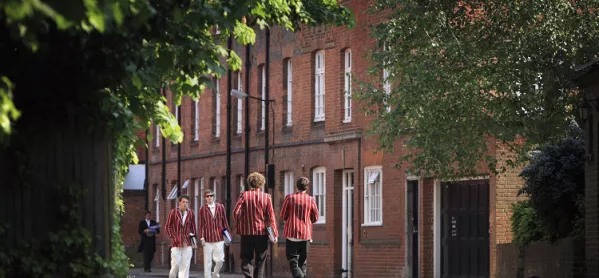- Home
- ‘We stand by our book: private education should be reformed’
‘We stand by our book: private education should be reformed’

In our book, Engines of Privilege, we argue that private schools, wielding something like three times the resources per pupil afforded to our state schools, represent a problem for our country. It is a poor way to concentrate Britain’s educational resources, and it helps to support a democratic deficit with so many positions of public influence being held by the privately educated; above all, it is extremely unfair in the way it skews life chances in the modern world, where education is so important.
We welcome debate with the leaders of the private sector industry; yet, unfortunately, Patrick Derham’s review in Tes fails to engage with our arguments.
Derham suggests, for example, that the pupil composition of some private schools is less exclusive than many state schools “up and down the country”, giving just one example. He accuses us of having “little understanding”, but chooses not to talk, however, about the facts we present on the concentration of private school attendance among the rich. He makes no mention of our finding that, despite the good intentions of some heads, there has been no overall progress in opening schools up to a wider population. Even the Independent Schools Council’s own data show, when you dig down into them, that bursaries only amount to some 4 per cent of private schools’ turnover, and have done for some years. Only 1 per cent of private school pupils pay no fees. You cannot gloss over these numbers.
Derham asserts, also, that partnerships with state schools are “making a real difference”. It would be great to see some real, scientifically validated, evidence on this - about, for example, the real resource transfers that might or might not be taking place through partnerships; or about whether there are genuine gains for state school pupils, in terms of numbers of pupils helped into high-ranking universities. Apart from a small number of exemplary cases of partnerships through sponsorship, there is nothing, and the whole process lacks transparency. We are entitled to question whether such partnerships have more than a minor effect.
Instead, Derham offers, as apparent evidence on the efficacy of partnerships, the ISC’s studies of the sector’s “impact” on the economy. We question these impact studies in the book, showing that, in the end, they merely testify to the size of the private sector - which is not in dispute. It is not us, but the chief inspector of schools, who complained in 2013 that many so-called partnership activities “were crumbs off your tables, leading more to famine than feast”. So far he has not been proved wrong.
Derham urges, instead, to “stop focusing on the 0.001 per cent”. But our book is about the private school pupils, who are 7 per cent of all pupils; and about the private schools, which are 10 per cent of Britain’s schools; and about the private schools’ resources, which are something like 17 per cent of all the educational pounds spent in schools.
Derham wants the debate to be “informed by rigorous research”, more or less implying that the book is not so informed. Yet all the facts and figures are properly attributed to respectable sources, including government-funded surveys, and worked out using replicable methods that any independent-minded person could check; many come from journal papers that have been scientifically reviewed by anonymous referees. Politicians of both right and left are considered critically in the book, for their failure to act. We do not accept that offering slurs on properly conducted research is a good way to debate, and urge that this discourse should be conducted without smears and name-calling.
What we object to most of all, however, is the misrepresentation of our argument: he attributes to us the idea that “private education is at the root of inequality in the UK”. Nowhere in the book is this stated. Rather, the book argues that reforming the private education system is a necessary condition for achieving a fairer education system; we do not, of course, think that such a reform would be sufficient on its own to achieve a better and socially just education system, let alone a better and more just society as a whole. Derham calls for a study of modern-day wealth inequalities and their origins. There are many of these, some very good.
This is not what our book is about. He wants us to look away at other sources of inequality - but this is a distraction from the specific problem of private schools.
Francis Green is a professor of work and education economics at UCL Institute of Education and David Kynaston is an English historian and author. They are the co-authors of Engines of Privilege: Britain’s private school problem
Keep reading for just £1 per month
You've reached your limit of free articles this month. Subscribe for £1 per month for three months and get:
- Unlimited access to all Tes magazine content
- Exclusive subscriber-only stories
- Award-winning email newsletters